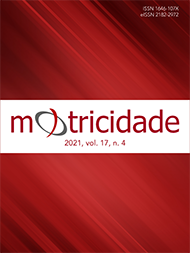Analysis and prediction of competition performance in master swimmers
DOI:
https://doi.org/10.6063/motricidade.25521Keywords:
Swimming, Results, Efficiency, GroupsAbstract
This study aimed to quantify the participation of male master swimmers during ten seasons (2008/2009 – 2018/2019) in the national master swimmers and predict the results for the 2020/2021 season in the events of 50 100, 200 and 400 m freestyle. Eight age groups were considered, namely, A to H with a total of 5,368 participants, in the four events analysed 50, 100, 200 and 400 m freestyle. The best time of each race was recorded in the selected age groups that took place in the last decade of the National Summer Championship, through the specific website “Swimrakings” (https://www.swimrankings.net/). The resulting equation for the calculation was y= (–) ax2 – bx + c, y being the rate of increase or decrease in swimming performance and the x variation depending on the year of events that one intends to estimate for 2021, x= 13. The results showed an increase in the number of participations in middle age groups (35-49 years) and a prediction of improvements in the results of 21 events for all the swimming races studied. In conclusion, we can verify that prediction becomes essential for the definition of new objectives and evolutionary trends in swimming.
Keywords: Swimming, Results, Efficiency, Groups.
Downloads
Published
Issue
Section
License
The authors of submitted manuscripts must transfer the full copyright to Journal Motricidade / Sílabas Didáticas Editions. Granting copyright permission allows the publication and dissemination of the article in printed or electronic formats, and copyrights start at the moment the manuscript is accepted for publication. It also allows Journal Motricidade to use and commercialise the article in terms of licensing, lending or selling its content to indexation/abstracts databases and other entities.
According to the terms of the Creative Commons licence, authors may reproduce a reasonable number of copies for personal or professional purposes, but without any economic gain. SHERPA/RoMEO allows authors to post a final digital copy (post-printing version) of the article on their websites or on their institutions' scientific repository.


